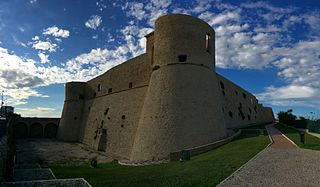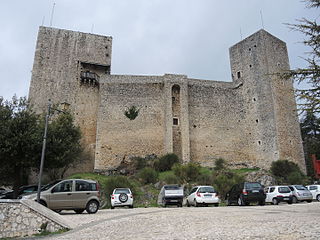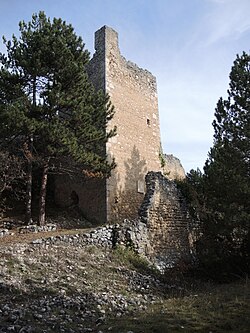
The Forte Spagnolo is a Renaissance castle in L'Aquila, central Italy.

Avezzano is a city and comune with a population of 40,801 inhabitants, situated in the Abruzzo region, province of L'Aquila, Italy. It is the second most populous municipality in the province and the sixth in the region. Avezzano was documented as an existing urban center in the ninth century. The city was destroyed by the earthquake of 1915. It was rebuilt after the 1944 Allied bombing. The city was decorated with the silver medal for civil merit, an award granted by the Italian Republic.

Castello aragonese is a Renaissance castle in Ortona, Province of Chieti (Abruzzo).

Castello Piccolomini is a Middle Ages-Renaissance castle in Balsorano, Province of L'Aquila (Abruzzo).

Castello Piccolomini is a castle in Capestrano, Province of L'Aquila (Abruzzo).

Castello Piccolomini is a castle in Celano, Province of L'Aquila (Abruzzo).

Castello normanno is a Middle Ages-18th century castle in Anversa degli Abruzzi, Province of L'Aquila Abruzzo, central-southern Italy.

The Castle of Bominaco is a medieval castle in Bominaco, Province of L'Aquila, Abruzzo, southern Italy.

Castello Cantelmo-Caldora is a Middle Ages castle in Pacentro, Province of L'Aquila (Abruzzo).

The Castle of Fossa is a Middle Ages castle in Fossa, province of L'Aquila, Abruzzo, southern Italy.

The Castle of San Pio delle Camere is a medieval castle in San Pio delle Camere, province of L'Aquila, Abruzzo, southern Italy.

Castello di Ocre is a medieval castle in Ocre, Province of L'Aquila, Abruzzo, southern Italy.

Rocca Orsini is a Middle Ages castle in Scurcola Marsicana, Province of L'Aquila (Abruzzo).

The Castle of Sant'Eusanio Forconese is a medieval castle in Sant'Eusanio Forconese, Province of L'Aquila, Abruzzo, southern Italy.

Castello di Carsoli is a medieval castle in Carsoli, Province of L'Aquila (Abruzzo), central Italy.

Castello di Pereto is a Middle Ages castle in Pereto, Province of L'Aquila (Abruzzo), Italy.

Castello De Sanctis is a Middle Ages castle in Roccacasale, Province of L'Aquila (Abruzzo).

Castello di Roccascalegna is a medieval castle in Roccascalegna, Province of Chieti, Abruzzo, southern Italy.

The Orsini-Colonna castle is a castle in Avezzano, Province of L'Aquila (Abruzzo).

Assergi is a frazione of the comune of L'Aquila, located about 11 km (6.8 mi) from the capital. With a population of just over 500, it is situated at an altitude of approximately 1,000 meters, below the western slope of the Gran Sasso in a small plain called the Piana di Assergi (Plain of Assergi). Assergi was formerly included in the comune of Camarda, which is directly to its south.





















